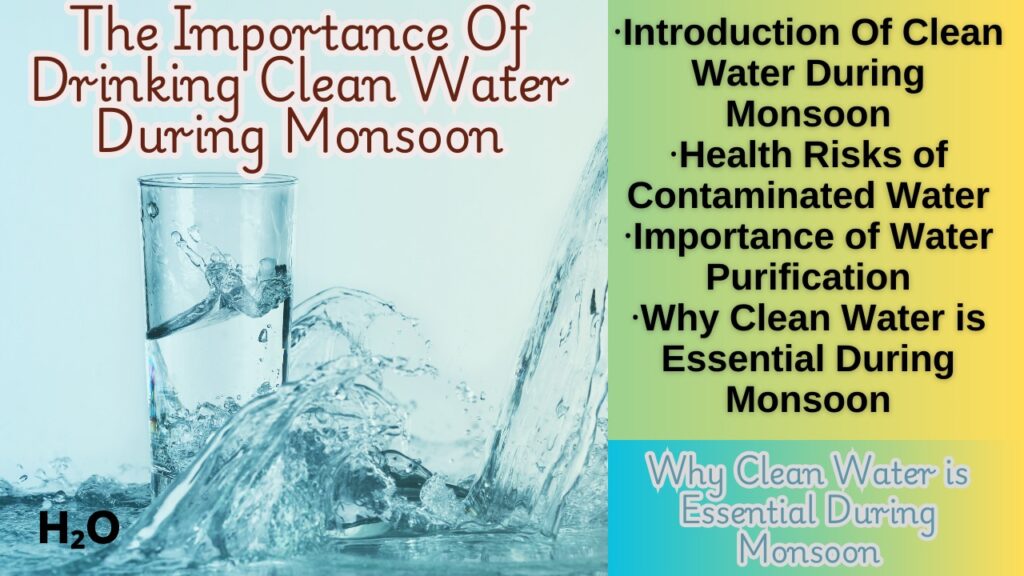Clean Water During Monsoon
The monsoon season, with its heavy rains and flooding, significantly elevates the risk of water contamination, making clean drinking water crucial for maintaining health. Contaminated water sources can harbor various pathogens, chemicals, and heavy metals, posing serious health risks. During monsoons, floodwaters can mix with sewage, industrial waste, and agricultural runoff, leading to the infiltration of harmful bacteria, viruses, and toxins into drinking water supplies. This contamination can cause a range of waterborne diseases such as cholera, dysentery, typhoid, and hepatitis, as well as gastrointestinal issues like diarrhea and vomiting, which can be particularly severe in vulnerable populations like children and the elderly. Moreover, the monsoon season can exacerbate the spread of mosquito-borne diseases, as stagnant water serves as the breeding ground for mosquitoes, increasing the risk of dengue, malaria, and chikungunya.
Clean water is essential for maintaining proper hydration, nutrient absorption, and overall health, as it supports vital bodily functions and strengthens the immune system. To mitigate these risks, it is crucial to implement effective water purification methods such as boiling water, using high-quality water purifiers, and ensuring safe storage practices to prevent contamination. Regularly checking and cleaning water tanks and reservoirs can also help maintain water quality.
Health Risks of Contaminated Water
Contaminated water can result in gastrointestinal issues, weakened immune responses, and the spread of diseases such as cholera, typhoid, and hepatitis. Pathogens thrive in moist environments, and the monsoon exacerbates the spread of these microbes through water sources. and Contaminated water poses significant health risks, leading to a wide array of waterborne diseases and other health issues. Pathogens such as bacteria, viruses, and parasites thrive in untreated water, causing illnesses like cholera, typhoid fever, dysentery, and hepatitis A. These diseases can result in severe gastrointestinal symptoms, including diarrhea, vomiting, and abdominal pain, which can lead to dehydration and, in severe cases, death, particularly among vulnerable populations like children, the elderly, and those with compromised immune systems. Chemical contaminants, such as pesticides, heavy metals, and industrial pollutants, present in contaminated water can cause chronic health problems, including cancer, liver and kidney damage, and neurological disorders.
Importance of Water Purification
Effective water purification methods, such as boiling, using water purifiers, and safe water storage practices, are vital during the monsoon to safeguard public health. These practices prevent disease outbreaks by ensuring that drinking water is free from contaminants. Water purification is crucial for ensuring safe and clean drinking water, particularly in regions where waterborne diseases are prevalent. It eliminates harmful pathogens, such as bacteria, viruses, and parasites, which can cause serious illnesses like cholera, typhoid, and dysentery. Additionally, water purification removes chemical contaminants, heavy metals, and other pollutants that can have long-term health effects.
Access to purified water is essential for overall well-being, supporting proper hydration, digestion, and the safe preparation of food. It is especially important during the monsoon season when water sources are more susceptible to contamination due to flooding and runoff. By investing in effective water purification methods, such as boiling, filtration, and chemical disinfection, communities can significantly reduce the incidence of waterborne diseases, promote public health, and ensure that all individuals have access to safe, clean drinking water.
What is the importance of clean water during Monsoon
Ensuring clean water access during the monsoon season is crucial for maintaining health and preventing disease outbreaks.
Heavy rains often cause water contamination by mixing clean sources with sewage, industrial waste, and agricultural runoff, increasing the risk of waterborne diseases like cholera, typhoid, and hepatitis A.
Drinking contaminated water can lead to severe gastrointestinal issues, such as diarrhea and dysentery, which are especially dangerous for children, the elderly, and those with weakened immune systems.
Clean water is also vital for proper hydration, particularly in the humid monsoon climate, where the body loses more water through sweat.
Additionally, safe water is essential for food preparation, ensuring that meals are not tainted by harmful pathogens.
Methods like boiling water, using water purifiers, and avoiding stagnant water sources can significantly reduce contamination risks.
Regular cleaning of water storage tanks and using chlorine tablets for disinfection are also effective strategies.
Conclusion
In conclusion, drinking clean water during the monsoon season is vital for safeguarding health and preventing the spread of waterborne diseases. The increased risk of contamination due to heavy rains and flooding necessitates proactive measures to ensure water safety. By adopting effective purification methods, such as boiling, using water purifiers, and avoiding stagnant water sources, individuals and communities can protect themselves from serious illnesses.
